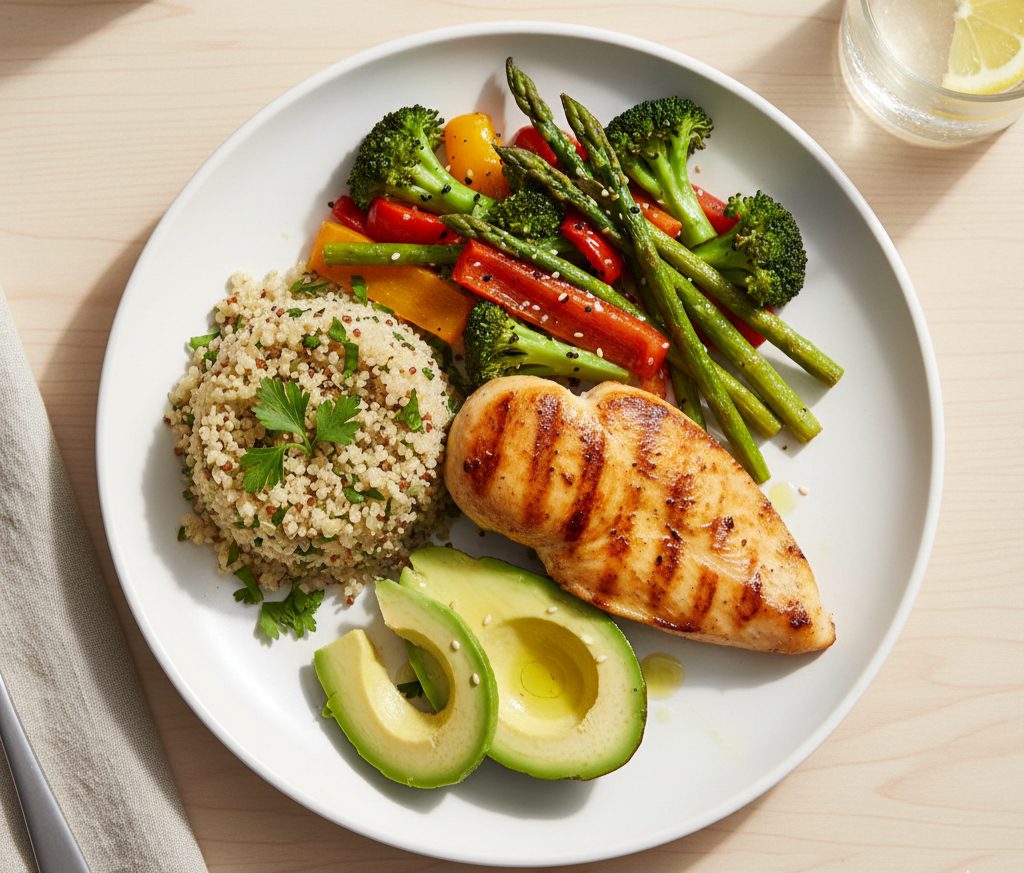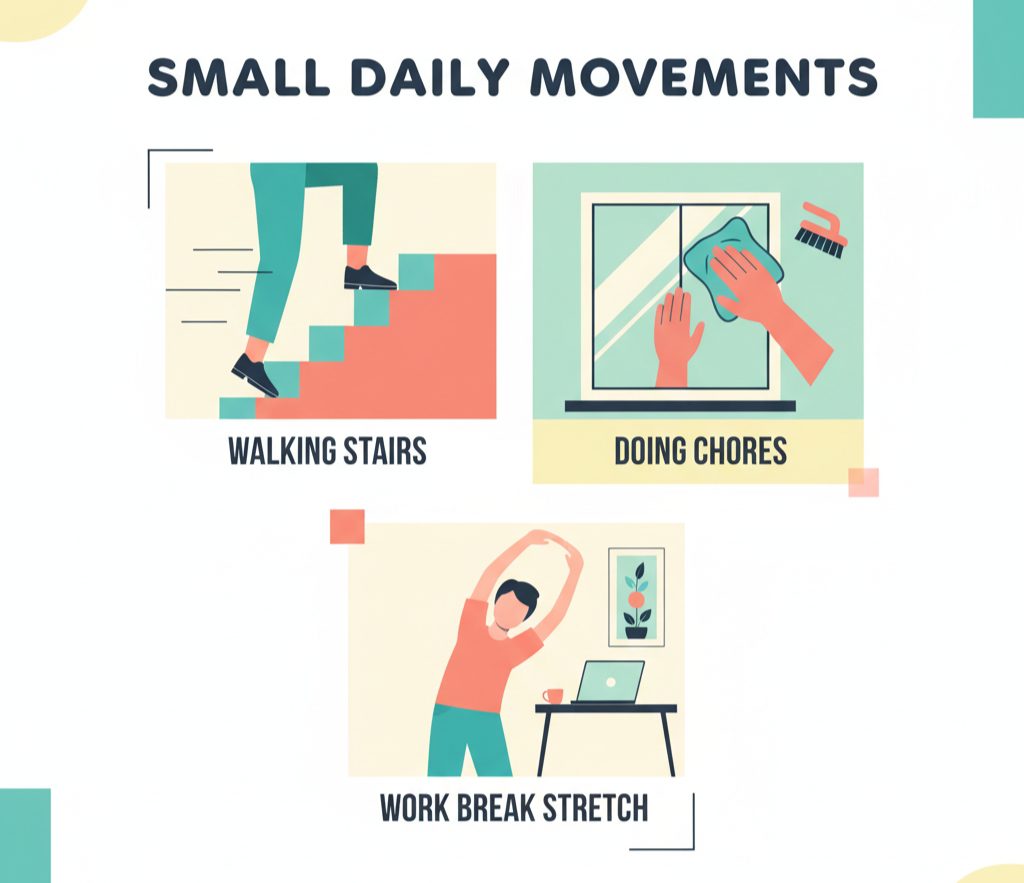Weight loss is one of most popular goals that people have for themselves. It's not easy to accomplish, and it can be even more difficult to keep up. Many people start out with great motivation and follow strict diets, or plans that promise quick results. Within weeks, however, frustration sets in. What is the reason? People fail because of unrealistic expectations, short-term diets and conflicting advice online. While restrictive eating and excessive exercise may produce quick results, they are rarely long-lasting and can lead to discouragement and weight gain.
Science-backed healthy habits are the key to lasting weight loss. The research consistently shows simple daily habits such as eating well-balanced meals, being hydrated, getting enough sleep, and managing your stress can have a far more lasting impact on weight loss than any quick fix. They work in harmony with the body's systems and not against them. This helps you to lose weight safely, while also improving your health.
This guide will teach you 10 weight-loss habits that are scientifically proven and can help anyone lose pounds, without expensive supplements or fad dieting. Every habit has been designed to be practical and sustainable. They can also fit in with your busy schedule, regardless of how much time you have. You will not only gain control of your health and energy by following these simple steps.
Use the Calories Bought Calculator at NutriFitCalc to understand your daily caloric expenditure and your body's energy burning. If you're interested in learning more about healthy weight management, the CDC offers reliable and research-based info.
1. Start Your Day with Protein — It Controls Hunger and Boosts Metabolism
Breakfast can have a major impact on your weight loss efforts. Protein-rich breakfasts do more than just fill you up. They help control your hunger hormones and reduce cravings. Plus, they keep your metabolism going throughout the day. Protein releases energy slowly, unlike simple carbohydrates that can cause blood sugar to spike and crash. It also helps you feel satisfied longer.
Research has shown that protein affects two important hormones, ghrelin and peptide-YY. A high-protein morning meal lowers the ghrelin level and increases peptideYY. This makes you feel satisfied, and reduces your desire to overeat later. The hormonal balance helps to curb overeating, late night cravings and other unhealthy behaviors.
The thermic effects of protein (TEF), the energy required by your body to digest and absorb the nutrients, is another hidden benefit of eating your morning meal with proteins. The highest TEF of all macronutrients is found in protein, meaning your body uses more calories to process it. This compares with fats and carbohydrates. You're simply boosting your metabolic rate by eating eggs in place of sugary breakfast cereals.
You can start your day off with protein by following these easy and scientifically-backed ideas:
- Eggs scrambled with spinach on whole grain toast
- Greek yogurt with strawberries and Chia Seeds
- Cottage cheese with banana slices or almonds
- Smoothie made from whey protein or plant-based powders, peanut butter, oats and a variety of other ingredients
- Mix overnight oats with flaxseeds and milk
Consistency is the key, not complexity. There's no need for extreme diets or expensive supplements. Just make small smart decisions that will keep you satisfied and energized.
Read NutriFitCalc’s detailed guide: High-Protein Diet Plan for Muscle Growth: What to Eat When. This guide explains the best way to plan your meals in order to maximize performance and recover.
For evidence-based nutrition insights, you can visit Harvard Health-Protein and Weight Management.
2. Eat Slowly and Mindfully — Let Your Brain Catch Up with Your Stomach
Many people in today's world are on autopilot, eating while they scroll through their phone, watch TV or rush through meals to get back to other tasks. Science shows this type of distracted eating can lead to overeating, and even poor digestion. Mindful eating is the solution. It's simple, but powerful. Slow down and savor each bite. Pay attention to your body.
If you eat quickly, the brain does not have time to get the message that your stomach has filled up. About 20 minutes is usually required for leptin, peptide-YY and other satiety signals to signal your brain that you're full. Slowly eating allows the brain to communicate with your gut, allowing you to consume less calories while still feeling satisfied. People who eat slowly tend to feel more satisfied and eat less. This is a great way to lose or maintain weight.
It's not just about speed, but also awareness and connection. This means paying attention to the flavors, colors and textures of food, chewing slowly, savoring each bite and knowing when you are satisfied, not stuffed. The mindful approach reduces emotional eating, and helps prevent the cycle of guilt and binge-eating that is common with restrictive diets.
Here are some tips on how to incorporate mindful eating into your daily routine:
- Between bites, put down your fork. Allow yourself to taste and breathe your food for a few moments.
- Establish a rhythm for your meal times. Finish each meal within 15-20 minutes.
- Distractions are bad. Disconnect from screens to focus on the meal.
- You should listen to your body. Stop eating when satisfied, not when your plate is empty.
- “Express gratitude.” By taking a few moments to enjoy your food, you will naturally slow down.
It doesn't require you to be hyper-focused or perfect every time you consume. This is about developing awareness of your body and respecting its cues, allowing you the freedom to enjoy foods while still maintaining control. This practice will strengthen your relationship to food over time and support sustainable weight loss.
Explore the Harvard School of Public Health-Mindful Eating for more information and techniques backed by research. This article explains that slowing down eating can help improve digestion and control your appetite. It also promotes long-term good health.
3. Track Your Calories and Progress Regularly
Tracking your daily progress and calories is one of the best habits to lose weight. What gets measured gets managed. You will make better choices when you pay attention to how much and what you are eating. This is true even if you don't follow a strict diet. People who track their calories are more likely than others to maintain weight loss and lose it.
It's not about restricting calories, but about being aware and in control. Many people are unaware that they have been underestimating their daily calorie intake. You can easily derail your weight loss efforts with a small handful of almonds here, an extra tablespoon of rice there or even a sweet coffee. You can gain a better understanding of what triggers you to overeat by recording your meals.
Tracking has never been easier. Apps like MyFitnessPal or Lose It! allow you to track your meals and scan barcodes for instant estimates of calories. They also provide a comprehensive nutritional overview by tracking macronutrients such as protein, carbohydrates, and fats. Even a simple handwritten journal is highly effective if you want a more straightforward method. It's not about perfection, but rather, it is to be aware of your own habits.
NutriFitCalc also offers a Calories Calculator that will help you understand your own energy consumption. The calculator estimates your daily caloric needs according to your age, gender and height. It also takes into account your level of activity. Knowing your baseline allows you to plan your meals and exercises with specific goals in mind.
According to Mayo Clinic Calorie needs and Weight Loss a daily calorie deficit between 500 and 1,000 calories can result in a weight loss that is safe and lasting of up to 1 kilogram (2 pounds) each week. Remember, the goal is to fuel your body with the right nutrients while retaining energy, muscle and mood.
The real value of tracking your progress is to see how you change over time. This keeps you accountable, motivates and makes your weight-loss journey a rewarding, measurable experience.
4. Stay Hydrated — Water Can Boost Fat Burn and Reduce Appetite

The most important tool for healthy weight loss is water. It's simple, but often overlooked. Staying properly hydrated is crucial to how your body regulates hunger, burns calories and digests foods. Drinking enough water has been shown to increase your metabolism and help you lose weight.
Dehydration can slow down your metabolism because water is vital for nearly every cell process, from fat oxidation to energy production. Even a mild drop of 1-2% in your hydration levels can cause you to feel fatigued, hungry and sluggish. People often confuse thirst with hunger and eat more than they need to. This confusion can be avoided by drinking water prior to meals. It also helps reduce calories.
This effect has been confirmed by several studies. Drinking 500 ml of water (about two cups) 30 minutes prior to meals can help you eat less and shed more pounds over time. The water acts like a natural appetite-suppressant, filling your stomach and telling your brain you are satisfied earlier. Water also improves digestion, helps flush out toxins and keeps your muscles and skin healthy as you shed pounds.
These simple and practical tips will help you to stay hydrated, which in turn can boost your performance.
- Drink a glass or two of water in the morning to jumpstart your metabolism.
- Even if you are not thirsty, keep a reusable water bottle on you at all times.
- You can add flavor to your water by adding lemon, mint, cucumber or other natural flavors.
- Avoid dehydration by drinking water prior to coffee or tea.
- If you are prone to forgetting to drink water throughout the day, set reminders to your smartwatch or phone.
The key to success is consistency. Simple changes, such as replacing sodas and juices that are high in sugar with water instead can help you cut hundreds of calories each week. The benefits of hydration include improved energy levels, better focus and digestion.
You can find detailed information about the impact of hydration on metabolism and weight loss in the National Institutes of Health - Hydration & Metabolism. This article explains the direct relationship between water consumption and calorie intake, as well as overall body composition.
You don't have to take extreme measures in order to lose weight. Drinking enough water can be all your body requires to recover and perform.
5. Prioritize Sleep — The Most Ignored Weight Loss Habit

Sleep is often overlooked when people are thinking about losing weight. Skip resting can make you more tired, but it also slows down metabolism and increases appetite. This makes fat loss harder. The latest research shows that if your body is not getting enough sleep, it will resist weight loss no matter what your diet and workouts may be.
This is a fascinating science. Leptin, and ghrelin are two hormones that play an important role in controlling appetite.
- Leptin tells your brain when you are full.
- Ghrelin signals to your body when you are hungry.
Leptin drops when you aren't getting enough sleep while ghrelin rises, causing a perfect storm of overeating. This imbalance causes you to crave carbohydrate-rich, high-calorie foods. Lack of sleep can confuse your appetite signals, reduce your metabolism and increase fat storage.
Resting well also helps to balance hormones, which regulate the way your body uses its energy. People who get between 7-9 hours sleep per night are more likely to have improved metabolism, better insulin sensitivity and better control of their appetite. Chronic sleep deprivation is linked with increased body weight, elevated stress hormones (cortisol) and low energy levels during exercise.
Try these scientifically-backed practices to build a healthy routine for bedtime:
- Even on the weekends, go to sleep and get up at the exact same time each day.
- Blue light, which disrupts the hormone melatonin (which helps you sleep), is harmful to your health.
- For better sleep, keep your bedroom dark, cool and quiet.
- Avoid caffeine during the evening and afternoon.
- Before bed, relax with some light stretching, meditation or reading.
Exercise, eating well, and staying rested are all essential for weight loss.
Visit the Foundation for Sleep - Weight Loss to learn more about how sleep affects appetite, metabolism and weight loss. These research-based insights reveal why sleep is the best fat-loss weapon you can use.
6. Manage Stress — High Cortisol Can Block Fat Loss
Chronic stress can sabotage weight loss even if you eat well and exercise regularly. Your body releases cortisol when you are constantly stressed out - whether it's from your job, school, relationship, financial concerns, etc. The hormone cortisol is meant to be a short-term solution to problems, but when elevated over a long period of time, it may do more harm than benefit, especially in terms of fat loss.
Cortisol is a hormone that triggers a number of biochemical reactions, which make it difficult to lose weight. Cortisol first increases appetite, which leads to craving comfort food - usually high in fat and sugar. Your body is trying to get quick energy in order to deal with perceived threats, but there's no real danger. These cravings, over time, can cause you to gain weight and store fat, especially around your abdomen, increasing the risk of heart disease and diabetes.
Stress can also affect your digestion, motivation, sleep and your ability to concentrate. These are all factors which directly influence your metabolism. During stressful times, you may skip your workouts, eat mindlessly or be too tired to prepare healthy meals. It's not a matter of lack willpower, but rather a hormonal imbalance in your body.
It is important to develop healthy stress management habits in order to protect your mind as well as metabolism. These are some practical tips to help you reduce cortisol and lose weight.
- Even 5 minutes of deep breathing will calm down your nervous system.
- Walking in the nature, or even around your house can help you release tension.
- Journaling can be a great way to relieve mental stress and gain perspective.
- Talking with family and friends who are supportive can reduce emotional stress.
- Sound therapy can help reduce stress hormones.
Stress management does not mean eliminating stress completely. That's simply impossible. It's more about building resilience, and giving your body healthy outlets for reset. You can reduce weight by learning to react calmly and not impulsively.
Explore the American Psychological Association- Stress and Obesity for in-depth research on how stress impacts appetite, hormones and body fat. They highlight that mental wellness and physical health are closely linked, and peace of mind can be just as crucial to weight loss as exercise and diet.
7. Focus on Whole Foods — Ditch Ultra-Processed Calories

The choice of whole foods, over highly processed ones, is one of the most important changes you can make to achieve long-term weight loss. This simple habit will completely change your digestion, energy, and ability to burn fat. Nutritious whole foods, such as fruits, vegetables and lean protein, along with nuts, seeds and grains, provide real nutrition to your body, rather than empty calories.
Ultra-processed food is often loaded with sugars and unhealthy fats. They also contain artificial additives which can cause inflammation and overeating. These foods are designed to taste good enough to light up your brain’s reward centres, which encourages you to consume more food even when you’re already full. It's hard to "stop at just one bite" and over time this leads to an excess of calories, fat storage, or both.
The science has consistently supported the notion that eating whole foods helps to maintain a healthy weight. Whole foods are richer in fiber which helps to slow digestion, keep you feeling fuller for longer and stabilizes blood sugar, helping prevent sudden cravings. A bowl of oatmeal, berries, and almonds, for example, provides sustained energy while sugary cereal with the same number of calories can make you feel hungry within hours.
Try these simple strategies to make your switch more comfortable:
- Every meal, fill half of your plate with veggies. Low in calories, but rich in fiber and nutrients.
- Instead of packaged or fried meats, choose unprocessed protein sources like eggs, poultry, fish, lentils, tofu or chicken.
- Choose whole grains like brown rice, quinoa or oats over refined white pasta or bread.
- Instead of cookies and chips, snack on fruits, yogurt, or nuts.
- Fresh, whole food is usually found on the outer perimeter of supermarkets.
It's not about perfection, but about progress. Over time, even small changes, such as swapping soda for water, or roasted chickpeas for fried snacks, can have a big impact. You will be rewarded with improved digestion, improved mood and easy fat loss.
You can also find out more about the following: World Health Organization - Healthy Diet Guidelines Diets high in whole food not only promote a healthy body weight, but they also lower the risk for chronic diseases such as diabetes, heart disease and obesity. Whole foods are the best way to fuel your body in the natural manner. They give you results, without depriving yourself or restricting it.
8. Stay Active All Day — NEAT (Non-Exercise Activity Thermogenesis) Matters

Most people imagine spending hours at the gym to burn calories. It's surprising to learn that the vast majority of calories you burn each day are not from your workout. NEAT is short for Non Exercise Activity Thermogenesis. The NEAT acronym refers to small movements that you do throughout your day, but are not part of a formal workout. For example, walking to the shop, cleaning up, standing at work, and even fidgeting. The small movements you make throughout the day can have a big impact on your fat burning potential.
Research shows that people who are more active can burn up to hundreds of calories extra per day. This is compared with those who sit most of the time. The secret to naturally slim people is that they are active, but not necessarily working out. For example, walking for 15 minutes after eating lunch or taking the stairs rather than the elevator can increase your daily calorie intake.
Sitting long periods of time slows the metabolism, reduces circulation and can lead to weight gain and other issues. If you spend an hour at the gym, sitting for 23 hours will undo all of your hard work. Focus on small and consistent movements to keep your body burning fat throughout the day.
Here are some easy and practical ways to stay active, increase your NEAT and maintain your fitness naturally.
- Even two minutes walking every 30-60 mins can help.
- You can count your daily chores, such as sweeping the floor, gardening or organizing your home.
- Standing instead of sitting is a good idea. You can use a desk that allows you to stand and talk while on the phone.
- When it is practical, walk or cycle short distances rather than driving.
- Make your activity enjoyable by dancing or moving while you listen to music, or talk on the phone.
Small lifestyle modifications can result in long-term energy gains and a reduction of calories. It is also important to stay active during the day. This helps maintain blood sugar levels, supports cardiovascular health, and improves posture.
Try NutriFitCalc’s Calculator to see what your daily activities contribute to the total calories burned. This calculator helps you to estimate the number of calories that different activities will burn.
Each step, stretch or movement is important. It's not about exercising nonstop, but rather avoiding long periods of inactivity. If you include motion in your daily routine, weight loss will become a by-product, and not an effort.
9. Set Realistic Goals and Monitor Your Progress
Expecting too fast results is one of the main reasons why people quit their weight-loss journey. Truthfully, weight loss is not something that happens overnight. It takes patience and consistency. Set realistic and achievable goals to keep you motivated. They also help you track your progress. And they prevent disappointment if the scale does not drop as quickly as you had hoped.
Scientists have found that those who make specific, time-bound, measurable goals, are more successful than people who simply aim to “lose weight”.
It's not just about weighing yourself. Tracking your progress involves understanding the overall changes you've made. Your weight can stay the same but your body composition may improve (less fat and more muscle). It's crucial to track multiple indicators.
- Every two weeks, measure your waist, hips and chest.
- Pictures of progress can motivate more than numbers.
- Observe your fitness levels: How you feel, for example, as your strength or stamina improves.
- Calculators to help you understand the changes in body composition beyond weight.
NutriFitCalc offers BMI calculator as well as Ideal weight calculator for tracking your progress. You can use these tools to measure your progress based on height, age, gender and other factors. You can use the Calories Calculator as a guide to adjust your intake as you see your body changing.
According to CDC – Setting Realistic Goals a healthy and safe rate of weight loss can be 0.5-1 kilograms (1-2 pounds). While faster results can be exciting, they are often accompanied by muscle loss, fatigue and rebound weight. Although slow progress can be frustrating, it is the type that will last a lifetime.
Keep in mind that your journey is unique. Do not compare yourself to others, but rather focus on your progress. Each healthy decision counts and each small achievement deserves to be recognized. You can create a road map for success by tracking your progress regularly, setting realistic goals, and being aware of yourself.
10. Consistency Over Perfection — Small Changes Create Big Results
Consistency always wins out over perfection when it comes to achieving lasting weight loss. Many people begin their weight loss journey thinking they have failed if one day, cheat meal or workout is missed. The truth is that sustainable transformation doesn't require you to be perfect each and every day. Showing up and doing your best the majority of the time is what's important. Stay committed, even when it feels like progress has been slow.
Humans respond best to consistent, repetitive actions. Your metabolism will stabilize, your appetite hormones will balance, and you'll lose weight naturally when you consistently eat healthy meals, exercise, and sleep well. The biggest changes are made over time by a series of smart, small habits.
Consider this: Skipping a workout or eating dessert every now and then won't stop you from progressing, but quitting because of that will. It's not just a quick sprint to lose weight — you have a long-term relationship with your body. Focusing on consistency builds discipline and not guilt. It also creates momentum rather than burnout.
You can stay consistent by adopting some easy habits and mindsets.
- Strive for progress and not perfection. A 70-80% consistency routine will yield visible results.
- Routines are better than restrictions. When you make healthy choices automatic, it is easier to maintain consistency.
- Set realistic goals. Plan realistic goals.
- Small victories are worth celebrating. Every healthy meal, exercise, and extra glass of water counts as a win.
- Flexibility is key. When life becomes hectic, you may need to adjust your routines.
Consistency increases your mental strength. You build self-confidence each time you persist, even when you are not motivated. This discipline will become a natural part of you, allowing healthy living to be effortless.
Researchers emphasize that sustainable habits are more effective than temporary diets, because they change the way your brain interprets reward and effort. Your body will adapt, your metabolism will improve, and you'll change your mind-set from trying to “lose weight” to living an active, healthy lifestyle by repeating daily positive actions.
Consistency is the key to combining all you have learned — from eating whole foods and more protein, to managing stress and tracking calories, as well as sleeping better and eating more proteins — and putting it together. Daily small steps can lead to incre
About the Author
This article is written by the NutriFitCalc Team, a group of Food Science and Nutrition students who create simple, research-backed guides for healthy living.
We review global health sources like WHO and CDC to keep our content accurate and helpful.
